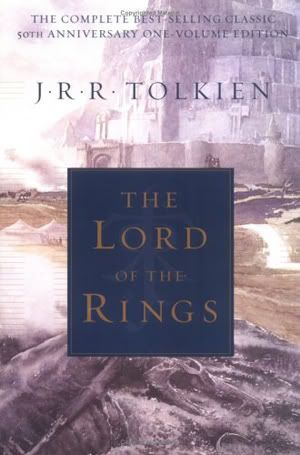
I'm going to discuss this as one work because that's how it was originally intended and I don't want to write three posts about it.
Anyway, The Lord of the Rings is very dense where The Hobbit was a bit more lean, and it can be taxing to read if you rush through it. It's best read at a leisurely pace over a long time if you're willing to spare it, otherwise it's easy to get lost in the endless descriptions of scenery and references to the kingdoms and people of times past. Even taking my time reading it, mostly with a baseball game on in the background, I occasionally found myself stuck on the same page for a while or realizing that I had gone for a while without actually absorbing what had happened. Still, if you're willing to put the time into it, there's a very interesting tale that's as much a history as a story (check out the hundred pages of appendices for proof). It's not the simpler child-friendly storytelling that The Hobbit was, but it still feels like a big expansion on the same world. In some ways the movies are an easier way to experience the plot, and some of the changes they made make more sense in the modern way stories are told, but everything in the books seems to work in the way Tolkien intended.
One example is the drawn out ending. People criticized the third movie for seeming to end multiple times, although I don't blame them for taking a few minutes to wrap up as much as possible for their twelve hour trilogy. However, that doesn't really compare to the book - there are over 80 pages in between the ring's destruction and the final line. The climax isn't even the last violent conflict in the story. The books really ignore good normal story structure a whole heck of a lot. There are multiple times where the power of the ring's seduction is compromised by people who aren't even affected by it. It's hard to say how much was really contrary to standard practice at the time because I'm not sure how long the standard way has been in place.
Another note of interest is that for a lot of the time, the focus doesn't even seem to be on Frodo and the quest. The first "book" is pretty much all hobbits all the time as they have some mysterious adventures that were actually pretty interesting yet mostly cut from the films, although starting with the second part, more pages are dedicated to Aragorn and humanity's last stand against the hordes of evil than the ring's secret journey towards destruction. It's where a lot of the "epic" feel comes from, and definitely had more influence on the future of fantasy literature than a desperate trek in foreign lands with a traitor for a guide. You get the feel that Tolkien really loved all his characters, and had a special affection for the plight of mortal men, cursed with weak wills and short lifespans. The Lord of the Rings is really about men and their kingdoms in the end, with his fascination with elves covered more in The Silmarillion, which I'm going to attempt to read soon. He's not an easy guy to read, but his dedication to his work is pretty admirable.
AAAAAGGGHHHH
16 years ago


































No comments:
Post a Comment